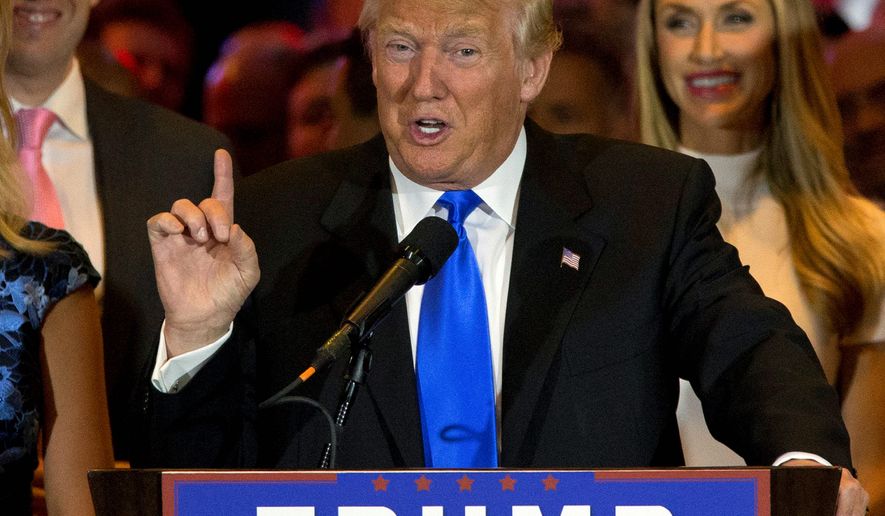ANALYSIS/OPINION
Critics may be standing on soft ground in claiming that Donald Trump can’t unite the Republican Party because he’s at odds with the conservative movement and the party on core policy issues, being to the left of Hillary Clinton on key subjects.
The Trump skeptics run the gamut from famed TV anchors to cable news analysts, from nervous Republican consultants to “Never Trump” ideological revanchists. The odd coalition puts the likes of neoconservative Bill Kristol, warhawk Lindsay Graham, commentator George Will and former GOP presidential nominee Mitt Romney in the same dump-Trump bed.
One of the cited issues supposedly showing Mr. Trump is a liberal at heart is entitlements, specifically his opposition to increasing the retirement age or reducing the benefits of Social Security.
But disinclination to any serious tampering with Social Security has been common in the same conservative circles since drastic diminutions or replacement were opposed by social conservative Gary Bauer, the former evangelical leader of the Family Research Council who ran for the GOP nomination in 2000. Even President George W. Bush, who pushed for retirement-savings accounts to augment but not replace Social Security, was wary of the proverbial third rail of politics.
Trump naysayers claim he is running to the left of the Democratic former secretary of state because Mr. Trump claims he opposed the Iraq War in 2003, saying it would be pointless, destabilizing and unwinnable.
But almost all the other 16 rivals for the GOP nomination expressed reservations or outright opposition during their campaigns to the war, to national building and regime change. And judging by the polls, opposition to the war is a better general election stance as most Americans have come to agree with it as the costs to the U.S. Treasury grew past $2 trillion over the years.
On the question of whether initiating the Iraq War was the right or wrong thing for the U.S. to do, a Quinnipiac University Poll released last May found that 78 percent of Democrats and 65 percent of independents, but only 28 percent of Republicans said “wrong.”
Mr. Trump won the nomination of the party whose members told pollsters they supported the war. Now Mr. Trump faces a general election in which independents will almost surely carry the balance of power and in which he appears set to bring more Democrats to the GOP column than any Republican nominee since Ronald Reagan.
Mr. Trump wants to spend more money on military preparedness and on infrastructure. Strong national defense, as distinct from nation building abroad, is a hallmark of Republicanism and conservatism. Indeed, former House Speaker Newt Gingrich, credited with taking the House for Republicans for the first time in 40 years, said those stances resemble the World War II hero who ascended to the presidency.
“I think Trump could be a return to more of an Eisenhower kind of realism that nonetheless is conservatism. And he may do more to dismantle the left than anybody in our lifetime,” Mr. Gingrich said in a video.
It should not be difficult to sell infrastructure to the GOP base, which has to travel over deteriorating bridges and roads and fly in and out of airports that The Donald says remind him of Third World airport terminals.
Mr. Trump may be able to bridge the longstanding gap within the GOP electoral coalition between war hawks and noninterventionists. His foreign policy speech last week won praise from John R. Bolton, who was ambassador to the United Nations under the younger President Bush and has consistently endorsed an aggressive military stand by the U.S. over the years.
“The speech put Trump in the mainstream of Republican foreign policy,” Mr. Bolton told The Washington Times. “That’s what he needed to accomplish, and that’s what he did.”
On taxes, the real estate billionaire and reality TV host is more or less in tune with GOP policy over the past 40 years.
He wants to drop from the tax rolls single people who earn up to $25,000 and married couples who make up to $50,000. Jack Kemp and his brand of Republican would have approved of that, though many other conservatives maintain that everyone should pay at least some federal taxes so that they have skin in the tax-cutting game.
He would as president urge Congress to lower tax rate brackets to 10 percent, 15 percent and 20 percent and the top long-term reduce capital gain rates to 20 percent — increasing incentives to work and save in conservative economic theory.
Former Arkansas Gov. Mike Huckabee, an evangelical Christian and former GOP presidential wannabe, said that the part of the American political right that wasn’t already in the Trump column is getting in line behind him.
“Ted Cruz was half right in his campaign speeches when he said that ’conservatives are coalescing.’ In the end, they coalesced, all right, but around Donald Trump,” he said.
• Ralph Z. Hallow can be reached at rhallow@gmail.com.




Please read our comment policy before commenting.